Rio Cinema facade, 1985 (Rio Cinema Archive)
This is the second of our guest submissions that consider the positionality of the researcher in the archive. Selina Robertson uses archival research, re-imaginings and re-screenings to trace absented histories of lesbian and feminist cinema of the 1970s and 1980s.
Whenever I think about my research, I always seem to return to the same lines of dialogue from Desperately Seeking Susan, Susan Seidelman’s great feminist film from 1985 that was screened at the Rio Cinema in East London on its release (see Fig 1).
The dialogue goes,
Cigarette Girl: Susan! My god we thought you were dead!
Susan: No, just in New Jersey
The lines are funny to read out and I always enjoy hearing people (and myself) laugh out loud when I attempt to perform a faux downtown New York City accent. I also have a vague memory of going to the cinema to see the film when it came out, possibly in New York or London. I can’t be sure. The fallibility of memory, cinema-going, women’s film histories and the archive remain a central preoccupation of my research, I am drawn to Cigarette Girl and Susan’s quick-fire exchange because they take me back to my memory of watching the film as a young teen, but they also speak directly the issue of feminist film historiography and the ways in which we might critically, discursively, affectively and creatively engage with absented histories in the archive. In effect, where and how do we look for the story?
Rio’s ‘Archive room’, 12 December, 2020 (Image: Selina Robertson)
I have been working in the archive at the Rio, a two-screen art deco cinema which has been operating as a community cinema since 1979. Over ten years ago, Charles Rubenstein (the Rio’s former film programmer and general manager) told me about the Rio’s history in the 1980s and the women’s film screenings, parties and events that took place in the basement. After speaking to a few people who were there at the time, I realised that the Rio held the grassroots radical archives of Hackney’s many local communities (in 2020 these histories were turned into a book). The ephemera I was interested in excavating was the Rio’s feminist and lesbian film archive, specifically the distinctive film programming and curating work carried out by the Rio’s film programmers in 1979/80 as well as two feminist collectives, the Rio Women’s Cinema and the Women’s Media Resource Project, who were active at the Rio during the 1980s.
As I started to look through the historical documents and talked to more people, I realised that this unorthodox, fragmented archive held the cultural memory of a dynamic, political, community focused feminist and lesbian film programming and curating practice, a history that was directly linked to Club des Femmes (of which I am founder member) and our practice of ethical curating, whereby we position queer feminist film curation as a critical, theoretical and activist tool. Since 2010, Club des Femmes had been programming special film screenings and events at the Rio without any historical knowledge or memory about our predecessors’ film programming activist work. My research is, in effect, a chance to find out more about Club des Femmes’ pre-history in London, to write new scholarship through practice based research on the often perceived ‘invisible’ work of film programming, drawing on the memories of the women who there at the time. With a focus on how cultural memory as knowledge in the archive gets passed down through affects and cultural objects, I am mapping a material history of how feminists, lesbians and queer people working in cultural film exhibition instigated and shaped the reception and circulation of a dynamic feminist, lesbian and queer moving image culture in the United Kingdom.
The question remains, how can there be a feminist and lesbian film history without a history of how films were exhibited and viewed? These 1970s and 1980s film festivals and screenings formed the basis and starting point for heated discussion and debate, and for the genesis of feminist and lesbian film theory and writings on film history. A queer feminist archival practice can open up a space of dialogue, reflection as well as participation for these vital intergenerational conversations to take place. Film programming and curation as queer feminist film historiography contributes to a wider understanding of how we might do feminist film history today. By keeping these feminist and lesbian moving image histories public, we give them back to cinema audiences and by doing so we secure their queer feminist film future(s).
Gay Pride Week at the Rio, June 1980. (Rio Cinema Archive)
Rio Women’s Cinema Poster (Rio Cinema archive)
Rio Women’s Cinema
We want to show the work of contemporary filmmakers, including shorts and animation, as well as rediscovering early women directors such as Maya Deren, Alice Guy and Lois Weber and occasionally comparing them to Hollywood’s “women’s” film. We will invite the filmmakers to some of the showings for discussion. (Rio Women’s Cinema archive, 1984)
Women’s Media Resource Project. (Maggie Thacker archive, 1986)
Women’s Media Resource Project
Our aim is to provide practice expertise using all forms of the media with the intention of creating an alternative to male-defined cultural propaganda. To create an expanding network of information and education by and for women. To provide and make accessible through outreach work our facilities to all women and, in doing so, to bridge the gap-dividing women by class, race, education, age, occupation, ability and sexual orientation. We hope to offer a friendly and relaxed workspace in which women can use the media resource.
(Women’s Media Resource Project archive, 1983)
Feminist Re-Imaginings at the Rio 1980-2020
Feminist Re-Imaginings at the Rio-1980-2020 flyer. Designed by Sarah Wood.
From 22 February – 30 May 2020, as part of my practice-based research at the Rio I had planned a series of feminist re-imaginings, re-screenings, archival activations and reflections. I was able to facilitate the February event but because of the pandemic I cancelled the rest of the project before the Rio was ordered to close at end of March 2020.
Selina Robertson is a PhD practice based researcher at Birkbeck College in the Film, Media and Cultural Studies department. Her research focuses on the intersection between feminist, lesbian and queer film historiography, cultural memory and the archive. In 2007 she co-founded queer feminist film curating collective Club des Femmes. She works part time as a film programmer at the Independent Cinema Office.

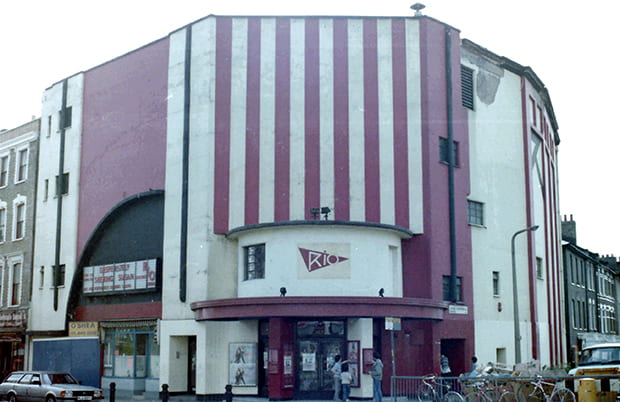
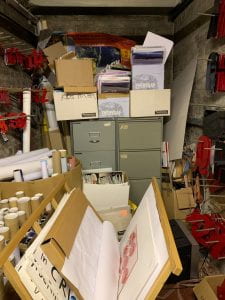
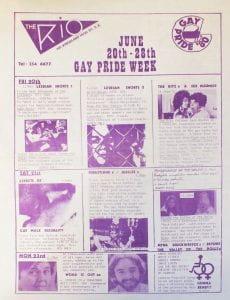
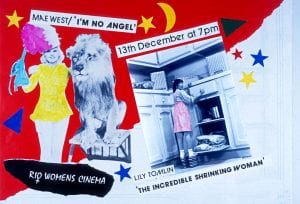
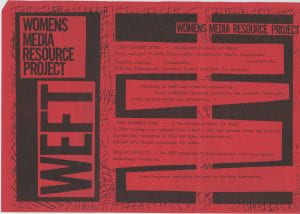
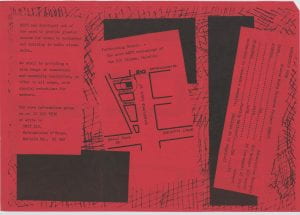
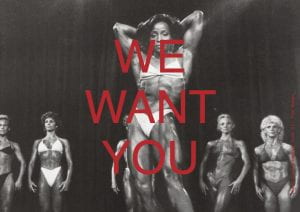
Published by